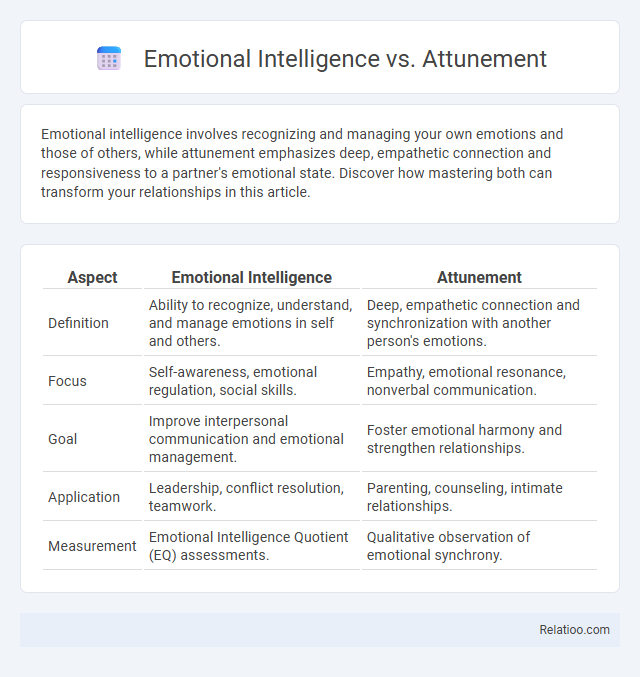Emotional intelligence involves recognizing and managing your own emotions and those of others, while attunement emphasizes deep, empathetic connection and responsiveness to a partner's emotional state. Discover how mastering both can transform your relationships in this article.
Table of Comparison
| Aspect | Emotional Intelligence | Attunement |
|---|---|---|
| Definition | Ability to recognize, understand, and manage emotions in self and others. | Deep, empathetic connection and synchronization with another person's emotions. |
| Focus | Self-awareness, emotional regulation, social skills. | Empathy, emotional resonance, nonverbal communication. |
| Goal | Improve interpersonal communication and emotional management. | Foster emotional harmony and strengthen relationships. |
| Application | Leadership, conflict resolution, teamwork. | Parenting, counseling, intimate relationships. |
| Measurement | Emotional Intelligence Quotient (EQ) assessments. | Qualitative observation of emotional synchrony. |
Understanding Emotional Intelligence
Emotional Intelligence involves recognizing, understanding, and managing one's own emotions and empathizing with others' feelings to foster effective communication and relationships. Attunement specifically refers to the deep emotional connection and responsiveness between individuals, emphasizing synchronized emotional states and mutual understanding. Understanding Emotional Intelligence enables individuals to improve attunement by accurately perceiving emotional cues and responding appropriately, enhancing social interactions and emotional harmony.
Defining Attunement in Human Interaction
Attunement in human interaction refers to the precise ability to perceive, understand, and respond to another person's emotional states and needs with sensitivity and alignment. Unlike emotional intelligence, which encompasses recognizing and managing one's own emotions as well as others', attunement specifically emphasizes the moment-to-moment connection and empathetic synchrony between individuals. This dynamic process involves active listening, nonverbal responsiveness, and genuine engagement, fostering deep relational bonds and effective communication.
Core Components of Emotional Intelligence
Core components of Emotional Intelligence include self-awareness, self-regulation, motivation, empathy, and social skills, which enable individuals to manage their emotions effectively and navigate social complexities. Attunement focuses on the ability to be in harmony with another person's emotional state, emphasizing empathy and responsive communication. While Emotional Intelligence encompasses a broader skill set for understanding and managing emotions internally and externally, attunement specifically highlights the interpersonal connection and emotional resonance between individuals.
Key Elements of Attunement
Key elements of attunement include active listening, empathetic understanding, and responsiveness to another person's emotional cues, creating a strong interpersonal connection. While emotional intelligence involves recognizing and managing your own and others' emotions, attunement specifically focuses on tuning into and mirroring another's emotional state. Your ability to engage in attunement enhances relationship quality by fostering trust and emotional safety through genuine emotional resonance.
Emotional Intelligence vs Attunement: What’s the Difference?
Emotional Intelligence involves recognizing, understanding, and managing your own emotions and those of others to foster effective communication and relationships. Attunement specifically refers to the deep connection and responsiveness to another person's emotional state, enabling you to accurately perceive and respond to subtle emotional cues. While Emotional Intelligence encompasses a broad set of skills for emotional awareness and regulation, attunement focuses on the moment-to-moment emotional alignment between individuals.
The Role of Empathy in Both Concepts
Emotional intelligence involves recognizing, understanding, and managing your own emotions and those of others, which relies heavily on empathy to navigate social interactions effectively. Attunement goes deeper by fostering a mutual emotional connection, where empathy enables you to resonate and synchronize with another person's feelings in real time. Both concepts highlight empathy as a crucial skill for building meaningful relationships, but attunement emphasizes shared emotional experience more intensely than emotional intelligence.
Applications in Personal and Professional Relationships
Emotional intelligence enhances your ability to recognize and manage emotions, improving communication and empathy in both personal and professional relationships. Attunement strengthens connection by fostering deep understanding and responsiveness to others' emotional states, promoting trust and collaboration. Combining emotional intelligence with attunement enables more effective conflict resolution and enhances relationship satisfaction across diverse social and work environments.
Benefits of Developing Emotional Intelligence and Attunement
Developing emotional intelligence enhances self-awareness, empathy, and effective communication, leading to stronger interpersonal relationships and improved conflict resolution skills. Attunement deepens emotional connections by fostering sensitive understanding and responsiveness to others' feelings, which promotes trust and collaboration in both personal and professional settings. Cultivating both emotional intelligence and attunement drives emotional regulation and social harmony, contributing to greater psychological well-being and team cohesion.
Common Misconceptions and Overlaps
Emotional intelligence often overlaps with attunement, but common misconceptions blur their distinctions; emotional intelligence refers broadly to recognizing, understanding, and managing one's own and others' emotions, while attunement specifically emphasizes a deep, empathetic connection and responsiveness to another person's emotional state. People frequently conflate attunement with empathy alone, overlooking its active process of adapting behavior based on emotional cues, which is integral to both attunement and emotional intelligence. Recognizing the nuanced differences helps clarify effective interpersonal communication and emotional regulation strategies, as attunement drives real-time emotional alignment beyond the cognitive skills highlighted in emotional intelligence frameworks.
Cultivating Emotional Intelligence and Attunement Skills
Cultivating emotional intelligence involves developing your ability to recognize, understand, and manage your own emotions while effectively perceiving the feelings of others. Attunement requires tuning into nonverbal cues, fostering deep empathy, and creating strong interpersonal connections through active listening and presence. Enhancing both emotional intelligence and attunement skills strengthens your capacity for meaningful communication and emotional resilience.

Infographic: Emotional Intelligence vs Attunement
 relatioo.com
relatioo.com